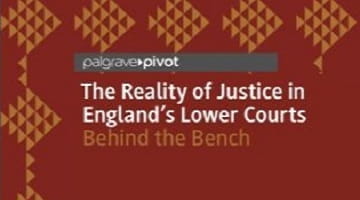Why study this course with LJMU?
- Excellent research-led teaching focused on the interplay of theory, policy and practice
- Benefit from influential connections - your teaching team has strong local, national and international links with academics, community groups and justice campaigns, offering you invaluable first-hand learning experiences
- Flexible ‘student-centred’ learning pathway with research or practice-based options (ideal for those already in the workplace)
- Learn from experts who bring professional currency and expertise to the fore and help you develop your ability to fulfil a strategic leadership position
- Full Time Study Option Available
About this course
Take a fresh perspective on the world of criminology. Engaging with cutting-edge debates in criminology, you’ll look at some of the most recent and advanced intellectual developments from around the world in relation to crime, (in)justice, and social harm.
Created by passionate subject specialists, this masters programme will help you develop advanced skills in research and theory, with a specific focus on policy and practice. You will take a fresh perspective on the world of criminology.
The study of Criminology is not just about the institutions of the criminal justice system. You will be encouraged to take a critical approach that examines issues of power, inequalities and social harm.
This interdisciplinary MA gives you the chance to look at Criminology from the perspective of various other disciplines such as Geography, History, Philosophy, Psychology, Political Science and Sociology.
As well as developing your advanced skills in research and theoretical application, the programme places a strong emphasis on the implications for policy and practice. It includes a strong comparative component, encouraging students to consider some of the international dimensions of crime, social harm and state responses to them.
Surround yourself with people who bring out your best...
“My interest in the field of criminology lies in challenging how we produce and share knowledge, reconsidering who we listen to and how we respond.”
Dr Will Jackson, MA Criminology Programme Leader
Course modules
Discover the building blocks of your programme
Further guidance on modules
Modules are designated core or optional in accordance with professional body requirements, as applicable, and LJMU’s Academic Framework Regulations. Whilst you are required to study core modules, optional modules provide you with an element of choice. Their availability may vary and will be subject to meeting minimum student numbers.
Where changes to modules are necessary these will be communicated as appropriate.
Core modules
Optional modules
Your Learning Experience
An insight into teaching on your course
Study hours
The 180-credit programme will be taught across three semesters, typically this involves 2 days on campus.
Part time study students undertake one core module and two options in their first year, and their dissertation/practice-based research module and final core module in their second year.
Each pathway will consist of one 60 credit module (either a dissertation or placement module) undertaken across the whole academic year. Accompanying this, full time study students study two core modules in their first semester, and two optional modules in semester two.
Teaching methods
Teaching is delivered via a combination of lectures, workshops, seminars and one-to-one consultations with your tutors. You will also be expected to study independently and conduct your own self-directed research.
The teaching team is committed to ensuring you get the most out of your learning experience. Staff have office hours during which you can visit them to discuss your work and progress. You will also be allocated a personal tutor who will guide and support you throughout your time at LJMU.
Applied learning
The MA takes a student centred approach to learning, offering you the opportunity to individualise and customise your postgraduate degree by taking either a research pathway through it, a work placement route, or even a combination of both. You will be encouraged to take a fresh look at some established criminological theories and ideas, as well as being given a space through which some of the fields most contemporary and cutting-edge debates can be engaged with.
How learning is monitored on your programme
To cater for the wide-ranging content of our courses and the varied learning preferences of our students, we offer a range of assessment methods on each programme.
Staff on this programme place a high value on providing tailored feedback to students and you will normally receive extensive written feedback on assessments and regular feedback. This is designed to help you achieve your full potential.
Depending on the route you select, you will undertake either a 60 credit Masters Dissertation or a 60 credit assessed placement. Other forms of assessment may include: essays, exams, reports and briefing papers, case studies, portfolios, posters, presentations, debates, reviews and group work.
Course tutors

Dr Will Jackson
- Programme Leader
This MA will provide students with an opportunity to think differently about a whole range of subjects related to crime, deviance, and the agencies of their control. It has been written with the modern postgraduate student in mind. This programme will appeal to those who are interested in pursuing their academic studies through research, and those who want to increase their employability through gaining 'hands on' skills via a work placement.
This MA will provide students with an opportunity to think differently about a whole range of subjects related to crime, deviance, and the agencies of their control. It has been written with the modern postgraduate student in mind. This programme will appeal to those who are interested in pursuing their academic studies through research, and those who want to increase their employability through gaining 'hands on' skills via a work placement.
Dr Will Jackson is Senior Lecturer in Criminology and Programme Leader for the MA Criminology. Will joined LJMU as Lecturer in Criminology in September 2013 having previously taught at the University of Central Lancashire. Will's teaching is focussed on criminological theory, the history of criminology and criminal justice, policing, and interpersonal violence. His main research interests are: policing, political activism, and arts based methods for criminological research
Career paths
Further your career prospects
LJMU has an excellent employability record with 96% (HESA 2018) of our postgraduates in work or further study six months after graduation. Our applied learning techniques and strong industry connections ensure our students are fully prepared for the workplace on graduation and understand how to apply their knowledge in a real world context.
The MA Criminology degree would be particularly relevant to people working in, or hoping to work in, a range of fields including:
- research
- academia
- charities and community organisations
- children, young people's and youth justice fields
- the investigation of miscarriages of justice
- social work, prison and probation services
- policing
- media research
- writing and journalism
- teaching
- policy and administration
- government
- victim support
Tuition fees and funding
- Home part-time per year:
- £4,772
Fees
The fees quoted above cover registration, tuition, supervision, assessment and examinations as well as library membership and student IT support with access to printed, multimedia and digital resources including programme-appropriate software and on campus wifi.
Financial Support
There are many ways to fund postgraduate study for home and international students. From loans to International Scholarships and subject-specific funding, you’ll find all of the information you need on our specialist postgraduate funding pages. The University offers a range of financial support for students. You'll find all the information you need on our specialist financial support pages including details of the Student Support Fund and other activities to support with the cost of living.
Additional Costs
In addition to fees, students should also keep in mind the cost of:
- Accommodation
- Travel costs and field trips unless paid for by LJMU
- Stationery, IT equipment, professional body membership and graduation gown hire
Entry requirements
You will need:
Qualification requirements
How to apply
Securing your place at LJMU
To apply for this programme, you are required to complete an LJMU online application form. You will need to provide details of previous qualifications and a personal statement outlining why you wish to study this programme.
Your university life
From accommodation and academic support to clubs and societies. Find out what LJMU has to offer.
Related Links
Talk to our students
Connect with a current LJMU student for advice and guidance on university life, courses and more.
See what our students are saying
At LJMU we want you to know you’re making the right choice by studying with us. You can see what our students are saying about their experience with us via the following websites:
Related Links
News and views
Browse through the latest news and stories from the university
The University reserves the right to withdraw or make alterations to a course and facilities if necessary; this may be because such changes are deemed to be beneficial to students, are minor in nature and unlikely to impact negatively upon students or become necessary due to circumstances beyond the control of the University. Where this does happen, the University operates a policy of consultation, advice and support to all enrolled students affected by the proposed change to their course or module.




























.png)